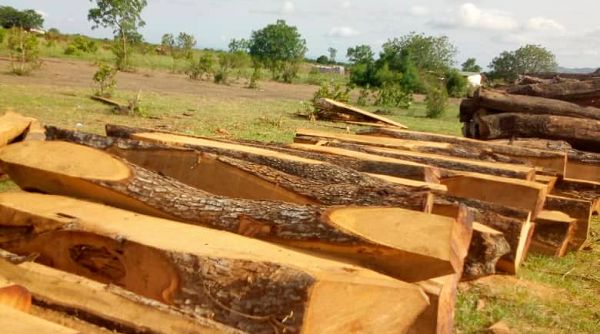Rosewood destruction in Northern Ghana: Call for urgent action
The lush forests of northern Ghana have long been home to a magnificent and valuable resource – rosewood. With its beauty and durability, rosewood has been a cherished part of our local economy and cultural heritage for generations.
However, the unchecked and unsustainable exploitation of rosewood in the fragile savannah ecosystem of northern Ghana in recent years has pushed this precious species to the brink of extinction, endangering our environment and threatening the livelihoods of communities that depend on it.
Alarming
Northern Ghana is currently facing a grave environmental crisis as rosewood destruction reaches unprecedented levels. In pursuit of quick profits, illegal loggers and traders have engaged in the indiscriminate felling of rosewood trees, leaving behind a trail of devastation.
This rampant exploitation not only disrupts the delicate ecosystem, but also disrupts the lives of countless individuals, who rely on the resource for their sustenance.
Environmental consequences
The consequences of rosewood destruction are far-reaching and alarming. The loss of forests not only depletes a valuable natural resource but also leads to devastating environmental impacts.
Soil erosion, reduced water quality and the displacement of vital plant and animal species are just a few of the detrimental effects we are witnessing. The delicate balance of our ecosystems is being thrown off, and the long-term consequences for our environment are deeply concerning.
Social, economic impact
The destruction of rosewood forests is not only an ecological, crisis but also a blow to the livelihoods of communities in northern Ghana. Many individuals, particularly those in rural areas, depend on rosewood for their economic survival.
Traditionally, rosewood is used for the production of high-quality charcoal and for building and construction especially by the local people. It is used for fuelwood, medicinal purposes, as a woodworking material and as a nitrogen-fixing plant that helps to improve nutrient-depleted farmlands.
The loss of this resource therefore jeopardises their income and exacerbates poverty levels, further deepening socio-economic disparities.
The communities affected by the depletion of rosewood face an uncertain future, with their way of life under threat.
Call for action
To address this pressing issue, immediate and concerted action is required from all stakeholders involved. The government, civil society organisations, local communities and the public must work together to tackle rosewood destruction head-on and ensure a sustainable future for northern Ghana.
• Strengthening Law Enforcement and Regulatory Frameworks: The government must enhance efforts to combat illegal logging and trade through stricter penalties and effective monitoring mechanisms. Collaboration between law enforcement agencies, the judiciary, and local communities is crucial to deter and prosecute those involved in the unlawful extraction and trafficking of rosewood.
• Supporting Sustainable Alternatives and Livelihood Diversification: Investment in sustainable alternatives and the diversification of livelihoods is essential for communities heavily dependent on rosewood. By providing education, training, and support, we can empower these communities to engage in environmentally friendly practices and sustainable economic activities that protect both their well-being and the integrity of our forests.
• Promoting Public Awareness and Engagement: Raising public awareness about the consequences of rosewood destruction is vital. Robust public awareness campaigns should educate individuals about the value of our natural resources and the need for sustainable forest management.
By fostering a sense of responsibility and ownership, we can inspire collective action in preserving our forests for future generations.
Conclusion
The destruction of rosewood in northern Ghana demands our immediate attention and concerted efforts to reverse this devastating trend.
Preserving our natural heritage and sustaining the livelihoods of communities depend on our commitment to halt rosewood destruction.
Let us join hands, advocate for change, and work towards a future where our forests thrive, our ecosystems flourish, and the generations to come can inherit the beauty and abundance of northern Ghana.
Together, we can make a difference and protect the legacy of rosewood for generations to come.



